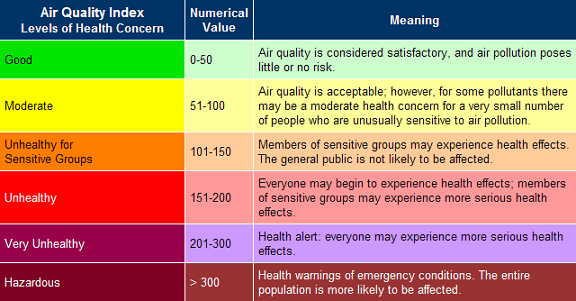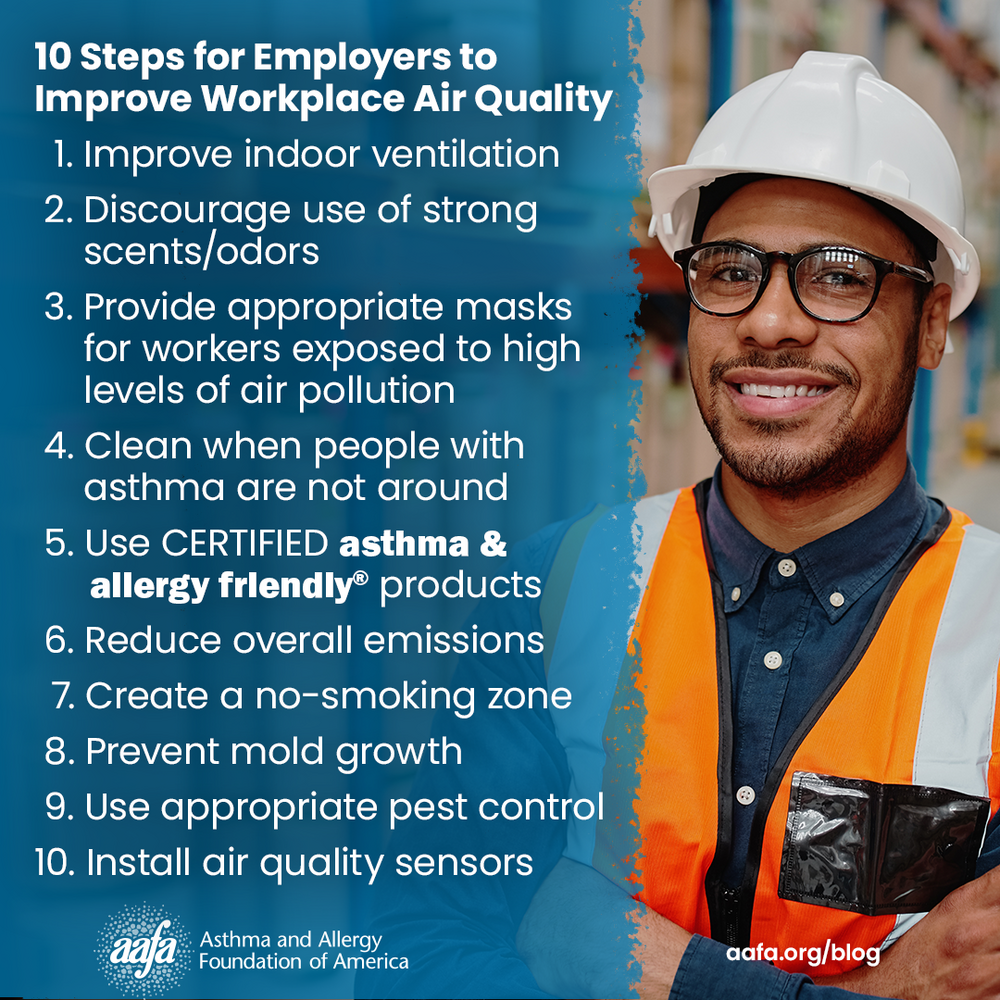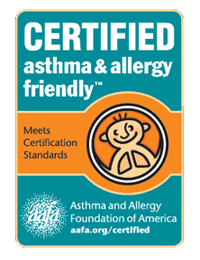October is National Indoor Air Quality Awareness Month and it’s the perfect time to address air quality in the workplace.
Asthma is a chronic condition that causes airways to become inflamed (swollen), making it hard to breathe. For adults, asthma is one of the leading causes of missing work. Adults miss more than 14 million days of work each year.1 Employers can improve work life for people with asthma by improving the air quality of the workplace.
Poor indoor or outdoor air quality can worsen asthma. Asthma and allergies are usually considered disabilities under the Americans with Disabilities Act (ADA). Employers and employees can work together to improve workplace air quality. Employers should make accommodations based on the needs of each person with asthma and the situation.
Small airborne particles cause serious air quality problems. They are found in haze, smoke, and airborne dust. People with asthma are at greater risk from breathing in small particles. The particles can make asthma worse. Both long-term and short-term exposure can cause health problems. Some of these include reduced lung function and more asthma attacks.
The EPA reports outdoor air pollution levels using the Air Quality Index (AQI). AQI reports the level of ozone and other air pollutants. When the AQI is 101 or higher, it can cause negative health effects in people with asthma. (Some people with very sensitive airways begin to experience symptoms when the AQI is 51-100). On “orange or red alert” days, people with asthma should limit their time outdoors.

Indoor air pollution is often monitored less than outdoor pollution, but your indoor air can be more polluted than the outdoor air.
Indoor air pollution can be caused by:
- Mold
- Cockroaches
- Dust mites
- Animal waste and dander, including mice
- Toxic fumes from products and manufacturing
- Poor ventilation and filtration
- Tobacco smoke
- Polluted outdoor air entering the indoor space
- Fuel burning
- Volatile organic compounds released by building materials, paints, solvents, electronic equipment, cleaning products, furniture, and more
Poor indoor air quality in the workplace also affects more than our lungs. It can also impact mental function, ability to focus, and productivity.2
Any work that causes small particles to enter the air may also create poor air quality in the workplace. For example, bakers may inhale small airborne particles of flour. This can affect their lungs and cause occupational asthma.
To reduce work absences due to asthma, employers can improve air quality in the workplace by taking these 10 steps:
- Improve ventilation in indoor spaces and use appropriate and effective air cleaning and air filtration devices to remove small particles from the air.
- Create a policy for employees that discourages strong scents/odors (no heavy perfume, cologne, essential oils, potpourri, etc.).
- Provide appropriate masks for workers exposed to high levels of air pollution (such as N95 respirators).
- Schedule cleaning and dusting to occur when employees with asthma are not around.
- Use products that are CERTIFIED asthma & allergy friendly®.
- Reduce overall emissions, fuel burning, and exhaust fumes in and around the workplace.
- Encourage employees to go tobacco smoke free (offer incentives!) and create a no-smoking zone around the workplace.
- Reduce excess moisture that may be causing mold growth indoors.
- Use appropriate pest control to reduce cockroach and mouse infestation.
- Install air quality sensors to monitor your workplace indoor air quality.

Improving ventilation and filtration also helps reduce the spread the coronavirus that causes COVID-19.
By improving the air quality of your workplace, it will improve the health of your employees, especially those with asthma.
 Melanie Carver is the Chief Mission Officer at the Asthma and Allergy Foundation of America. She leads the organization’s health communications, education, and community building to support people with allergies and asthma and improve health outcomes.
Melanie Carver is the Chief Mission Officer at the Asthma and Allergy Foundation of America. She leads the organization’s health communications, education, and community building to support people with allergies and asthma and improve health outcomes.
 To improve indoor environments for people with asthma and allergies, we have developed strict standards and certify products that meet all the standards. Look for the CERTIFIED asthma & allergy friendly® mark to confirm the product passed our standards to reduce exposure to allergens and improve air quality.
To improve indoor environments for people with asthma and allergies, we have developed strict standards and certify products that meet all the standards. Look for the CERTIFIED asthma & allergy friendly® mark to confirm the product passed our standards to reduce exposure to allergens and improve air quality.Visit aafa.org/certified to search for CERTIFIED products and learn more about the asthma & allergy friendly® Certification Program.
References
1. Barnett S and Numagambetov T. Costs of asthma in the United States: 2002-2007. JACI. 2011. Jan:127(1):145-152. DOI:http://dx.doi.org/10.1016/j.jaci.2010.10.020. http://www.jacionline.org/arti...(10)01634-9/abstract
2. Laurent, J. G. C., MacNaughton, P., Jones, E., Young, A. S., Bliss, M., Flanigan, S., Vallarino, J., Chen, L. J., Cao, X., & Allen, J. G. (2021, September 9). Associations between acute exposures to PM2.5 and carbon dioxide indoors and cognitive function in office workers: a multicountry longitudinal prospective observational study. IOP Science. Retrieved October 5, 2021, from https://iopscience.iop.org/art...088/1748-9326/ac1bd8.



Comments (6)